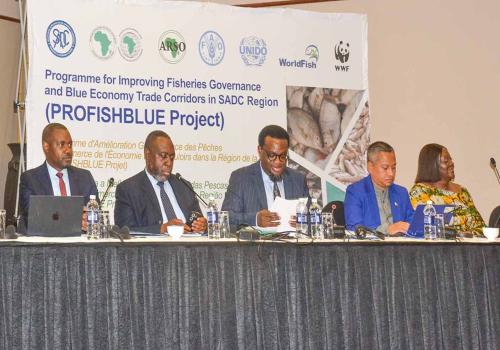The Southern African Development Community (SADC) hosted a dissemination event for the Programme for Improving Fisheries Governance and Blue Economy Trade Corridors in the SADC Region (PROFISHBLUE Project) in Lusaka, Zambia, on 24 September 2025. The main objective of the event was to exchange knowledge, share lessons learned and best practices, and reflect on the achievements of the project as it moves towards completion.
Delivering the keynote address on behalf of Dr. Max Mudenda Choombe, Permanent Secretary for the Ministry of Fisheries and Livestock of the Republic of Zambia, Mr. Success Mubanga, Director of Policy, Planning and Information, highlighted the significant efforts made by SADC Member States in improving food and nutritional security, creating employment opportunities and promoting intra-regional trade through fisheries and aquaculture. He emphasised that the PROFISHBLUE Project has put the region on track to expand the number of beneficiaries in fish value chains from 1.5 to 2 million people and to increase cross-border fish trade volumes from 150,000 to 250,000 metric tons. He called for greater concerted efforts to achieve these targets.
Mr. Mubanga also outlined the benefits realised by the Government of Zambia through the project. These include the genetic improvement programme for the indigenous Oreochromis andersonii species, piloting of one-stop border posts at key trade corridors, establishment of information-resilient systems, and implementation of nutritional outcomes through increased access to fish and fish-based products. He further cited the provision of various equipment and a refrigerated truck as part of the project’s tangible contributions.
Representing Madagascar as Chair of SADC, Dr. Andriantsilavo Jean Michel Rabary, the Director of Blue Economy underscored the central role of SADC as a catalyst for regional integration, bringing together key stakeholders, governments, communities, and development partners to ensure synergies in strategies and frameworks across the region. He commended the technical expertise, operational contributions, and financial support provided by partners, noting that the project demonstrated how international collaboration can be translated into tangible regional benefits. He also called on beneficiaries, including fish and aquaculture farmers, entrepreneurs, and community organisations, to ensure the sustainability of the project’s achievements through good practices, commitment, and ownership. He stressed that their determination is critical to preserving the project’s impact for future generations, thereby contributing to food security and regional economic development.
Mr. Domingos Gove, SADC Director of Food, Agriculture, and Natural Resources, highlighted significant progress in fisheries and aquaculture across Member States. He noted that production had increased by 11 percent in one year, confirming that the sector is on the right trajectory to harness the potential of the blue economy. He listed key achievements, including the development of regional genetic improvement programmes for indigenous tilapia, improved surveillance mechanisms to curb illegal fishing, advancements in regional standards and certification schemes, empowerment of small and medium enterprises, and strengthened institutional capacities in the fisheries sector.
Mr. Gove reaffirmed the Secretariat’s commitment to continue supporting Member States by integrating innovations into national and regional frameworks, facilitating dialogue, fostering partnerships, and mobilising resources to sustain progress. He positioned fish and fish-related products as strategic opportunities for Member States to help close the food insecurity gap, which he noted currently stands at 20 percent. He further urged Member States to explore financing opportunities through partnerships such as the African Development Bank (AfDB), which manages funding instruments amounting to billions of dollars.
Key activities during the event included discussions on the governance of transboundary fisheries and genetic resources, policy harmonisation for trade facilitation, a panel discussion on the regional fisheries network and a presentation of the successor programme for improving sustainable marine fisheries opportunities in the SADC region.
The PROFISHBLUE Project, approved by the African Development Bank in October 2021 with a grant of US$8.3 million, targets African Development Fund (ADF) countries, namely the Democratic Republic of Congo, Madagascar, Malawi, Mozambique, the United Republic of Tanzania, Zambia, and Zimbabwe. The project is implemented by the SADC Secretariat in close partnership with the African Organisation for Standardisation (ARSO), the Food and Agriculture Organization of the United Nations (FAO), the United Nations Industrial Development Organization (UNIDO), WorldFish, and the Worldwide Fund for Nature (WWF).
The dissemination event was attended by representatives from the SADC Secretariat, Zambia’s Ministry of Fisheries and Livestock, National Focal Points from ADF and Benguela Current Convention (BCC) countries, AWFISHNET Chapters (Malawi, Namibia, South Africa, Zambia), project implementing partners including GIZ, and the BCC Secretariat.

